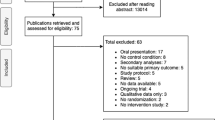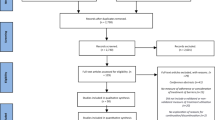Abstract
The aim of this qualitative analysis was to establish the content validity of two new patient-reported outcome (PRO) measures, Confidence in Performing Sexual Intercourse Questionnaire (CPSIQ) and Difficulty in Performing Sexual Intercourse Questionnaire (DPSIQ). Six separate qualitative studies (interviews/focus groups) were conducted from December 2009 to August 2010 by a single moderator and included 227 men with erectile dysfunction (ED; mean age: 54 years, 58% Caucasian). In the first three studies, concepts about ED and its treatment that were important and relevant to men with ED were identified. They included: getting and controlling erection; erection hardness; maintaining erection for desired duration; achieving and controlling ejaculation; satisfying partner; changing sexual positions; and frequency and spontaneity of sexual intercourse. In the subsequent two studies, concepts were confirmed and transformed into CPSIQ and DPSIQ items. The last study entailed a cognitive interview of the CPSIQ and DPSIQ to ensure that respondents’ interpretation of the PRO items were consistent with their intended meaning and that both recall periods and response sets were acceptable. After psychometric testing, the CPSIQ and DPSIQ could serve as complementary tools to existing PROs used in ED clinical trials.
This is a preview of subscription content, access via your institution
Access options
Subscribe to this journal
Receive 8 print issues and online access
$259.00 per year
only $32.38 per issue
Buy this article
- Purchase on Springer Link
- Instant access to full article PDF
Prices may be subject to local taxes which are calculated during checkout
Similar content being viewed by others
References
Althof SE, O'Leary MP, Cappelleri JC, Crowley AR, Tseng LJ, Collins S . Impact of erectile dysfunction on confidence, self-esteem and relationship satisfaction after 9 months of sildenafil citrate treatment. J Urol 2006; 176: 2132–2137.
Althof SE . Quality of life and erectile dysfunction. Urology 2002; 59: 803–810.
Araujo AB, Durante R, Feldman HA, Goldstein I, McKinlay JB . The relationship between depressive symptoms and male erectile dysfunction: cross-sectional results from the Massachusetts Male Aging Study. Psychosom Med 1998; 60: 458–465.
Althof SE, Leiblum SR, Chevret-Measson M, Hartmann U, Levine SB, McCabe M et al. Psychological and interpersonal dimensions of sexual function and dysfunction. J Sex Med 2005; 2: 793–800.
Cranston-Cuebas MA, Barlow DH . Cognitive and affective contributions to sexual functioning. Ann Rev Sex Res 1990; 1: 119–161.
Cappelleri JC, Althof SE, Siegel RL, Shpilsky A, Bell SS, Duttagupta S . Development and validation of the Self-Esteem and Relationship (SEAR) questionnaire in erectile dysfunction. Int J Impot Res 2004; 16: 30–38.
Swindle R, Cameron A, Rosen R . A 15-item short form of the Psychological and Interpersonal Relationship Scales. Int J Impot Res 2006; 18: 82–88.
Rosen RC, Riley A, Wagner G, Osterloh IH, Kirkpatrick J, Mishra A . The international index of erectile function (IIEF): a multidimensional scale for assessment of erectile dysfunction. Urology 1997; 49: 822–830.
U.S. Department of Health and Human Services, Food and Drug Administration, Center for Drug Evaluation and Research (CDER), Center for Biologics Evaluation and Research (CBER), Center for Devices and Radiological Health (CDRH). Guidance for industry: Patient-reported outcome measures: Use in medical product development to support labeling claims http://www.fda.gov/downloads/Drugs/GuidanceComplianceRegulatoryInformation/Guidances/UCM193282.pdf. (accessed December 2009).
DeRogatis LR . Assessment of sexual function/dysfunction via patient reported outcomes. Int J Impot Res 2008; 20: 35–44.
Miles MB, Huberman AM . 1 Qualitative Data Analysis: An Expanded Sourcebook 2nd edn. Sage: Thousand Oaks, CA, USA, 1994.
Glaser BG, Strauss AL . The Discovery of Grounded Theory: Strategies for Qualitative Research. Aldine Publishing Company: Chicago, IL, USA, 1968.
Kirshner B, Guyatt G . A methodological framework for assessing health indices. J Chronic Dis 1985; 38: 27–36.
Pontin D, Porter T, McDonagh R . Investigating the effect of erectile dysfunction on the lives of men: a qualitative research study. J Clin Nursing 2002; 11: 264–272.
Low W, Ng C, Choo W, Tan H . How do men perceive erectile dysfunction and its treatment? A qualitative study on opinions of men. Aging Male 2006; 9: 175–180.
Tomlinson JM, Wright D . Impact of erectile dysfunction and its subsequent treatment with sildenafil: qualitative study. BMJ 2004; 328: 1037.
Patrick DL, Burke LB, Gwaltney CJ, Leidy NK, Martin ML, Molsen E, Ring L . Content validity—establishing and reporting the evidence in newly developed patient-reported outcomes (PRO) instruments for medical product evaluation: ISPOR PRO good research practices task force report: part 1—eliciting concepts for a new PRO instrument. Value Health 2011; 14: 967–977.
Porst H, Vardi Y, Akkus E, Melman A, Park NC, Seftel AD et al. Standards for clinical trials in male sexual dysfunctions. J Sex Med 2010; 7: 414–444.
Araujo AB, Allen KR, Ni X, Rosen RC . Minimal clinically important differences in the vaginal insertion and successful intercourse items of the sexual encounter profile. J Sex Med 2012; 9: 169–179.
Acknowledgements
We thank Dr Stanley E. Althof, Dr Raymond C. Rosen, and Dr Allen Seftel for valuable input into the development of the Confidence and Difficulty in Performing Sexual Intercourse Questionnaires. This study was funded by Eli Lilly and Company.
Author information
Authors and Affiliations
Corresponding author
Ethics declarations
Competing interests
RH and AS are full-time employees and stockholders of Eli Lilly and Company. JH is President and CEO of The Henne Group, which has completed research agreements with Eli Lilly and Company. MM is a former employee of Eli Lilly and Company.
Rights and permissions
About this article
Cite this article
Hayes, R., Henne, J., Meldahl, M. et al. Establishing the content validity of the confidence in performing sexual intercourse and difficulty in performing sexual intercourse questionnaires. Int J Impot Res 25, 234–240 (2013). https://doi.org/10.1038/ijir.2013.22
Received:
Revised:
Accepted:
Published:
Issue Date:
DOI: https://doi.org/10.1038/ijir.2013.22
Keywords
This article is cited by
-
Psychometric validation of the Confidence in Performing Sexual Intercourse Questionnaire and Difficulty in Performing Sexual Intercourse Questionnaire
International Journal of Impotence Research (2014)



